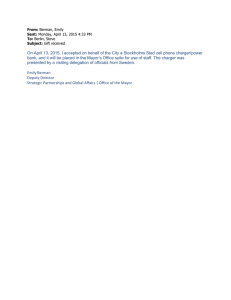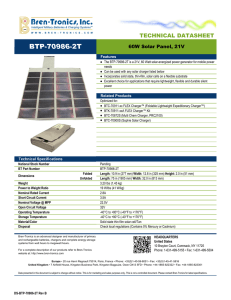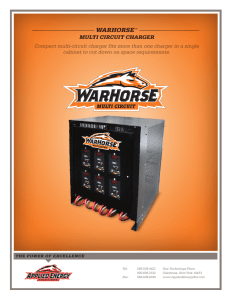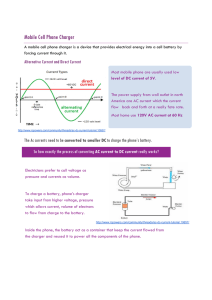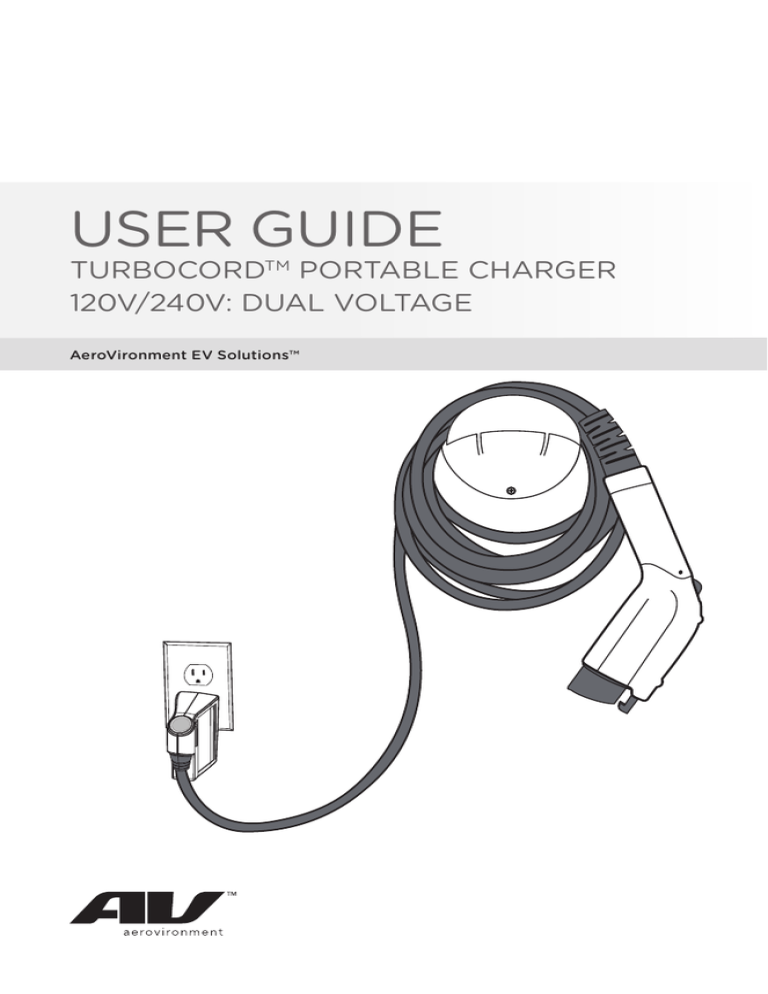
USER GUIDE
TURBOCORDTM PORTABLE CHARGER
120V/240V: DUAL VOLTAGE
AeroVironment EV Solutions™
© 2013 AeroVironment, Inc. All rights reserved.
AeroVironment, EV Solutions, and the AeroVironment logo are trademarks of AeroVironment, Inc.
Corporate names, trademarks, registered trademarks, service marks, symbols, and logos stated herein are property of their
respective companies.
Specifications are subject to change without notice. Images of the Dual voltage charger are representative; production models may vary. Dual voltage charger may be branded under different names.
No portion of these materials may be duplicated, used or disclosed without prior written permission from AeroVironment, Inc.
Disclaimer: This user guide includes the latest information available at the time of printing. AeroVironment, Inc. reserves the
right to make changes to this user guide and/or product without further notice. Changes or modifications to this product not
completed by an authorized service provider could void the product warranty.
Corporate Headquarters
AeroVironment, Inc.
EV Solutions™
181 W. Huntington Drive, Suite 202
Monrovia, CA 91016
Phone: 626-357-9983 or 888-833-2148
Fax: 626-359-9628
Email: ev@avinc.com
Website: www.evsolutions.com
OWNER’S RECORD
model:
TurboCord Dual Voltage Charger
serial number (s/n):
purchase date:
A NOTE ON CUSTOMER SUPPORT
To ensure superior service, please take note of your Serial Number when
contacting AeroVironment Customer Support.
Write down the Serial Number of your charger in the “Owner’s Record” above.
The Serial Number can be found on the bottom of the charger’s plug-in
module.
AeroVironment EV Solutions
Customer Support
1-888-833-2148
evscs@avinc.com
P22603-03,1
i
SAVE THESE INSTRUCTIONS!
This manual contains important instructions for the TurboCord Dual Voltage
Charger that shall be followed during installation, operation and maintenance
of the unit.
TABLE OF CONTENTS
SECTION 1: INTRODUCTION....................................................1
Symbol Usage..................................................................................2
About Your TurboCord Charger....................................................3
TurboCord Charger Components.................................................5
Required Outlets.............................................................................6
SECTION 2: USING YOUR DUAL VOLTAGE CHARGER.....7
Know Your Indicator Lights............................................................8
Charging Your Vehicle....................................................................9
120 VAC Mode.........................................................................9
240 VAC Mode.......................................................................10
Manual Stop................................................................................... 11
A Note on Auto-Restart............................................................... 11
SECTION 3: TROUBLESHOOTING....................................... 12
APPENDIX................................................................................. 15
Specifications................................................................................16
Installing the Cable Hanger.........................................................17
High Voltage Warning..................................................................18
State of California Proposition 65 Warnings..............................19
FCC Information............................................................................19
Safety Features..............................................................................19
Warranty.........................................................................................21
Index...............................................................................................22
ii
SECTION 1
INTRODUCTION
SYMBOL USAGE
DANGER
Indicates information about safety practices which, if not
followed, may result in serious injury or death.
.............................................................................................. WARNING
Indicates information about safety practices which, if not
followed, could result in personal injury or are necessary
to prevent fire or equipment overheating.
.............................................................................................. NOTE
2
Indicates helpful information for installation or usage, but
does not contain personnel or equipment safety related
information.
ABOUT YOUR TURBOCORD CHARGER
Thank you for purchasing the AeroVironment™ (AV) TurboCord Dual Voltage
Charger – our easy-to-use, compact, and portable power supply for your electric
vehicle’s on-board charger. The charger supplies and manages AC power to your
electric vehicle and is compatible with a variety of battery electric and plug-in
hybrid electric vehicles.
The charger will operate from either a 120 VAC or a 208/240 VAC 60 hertz power
source. The included adapter is required for 208/240 VAC operation.
KEY FEATURES
•
•
•
•
•
•
Dual voltage capability
Compact, portable design
Overheating protection
Quick-read status indicators
Underwriters Laboratories (UL) listed
SAE J1772 compliant
•
Auto-restart in event of ground fault or power outage
WARNING
The adapter is designed for use with the charger in 208/240
VAC operating mode only. DO NOT connect other devices
to the adapter. NEVER use the charger with any AC adapter
except for the adapter supplied by the manufacturer
specifically for use with this charger.
120 VAC Operation: the charger requires a 120 VAC single phase dedicated
circuit. It draws a maximum of 12-amp continuous current and requires a 15-amp
rated circuit breaker.
240 VAC Operation: the charger requires either a 240 VAC split phase, or a
208 VAC two phase dedicated circuit. It draws a maximum of 16-amp continuous
current and requires a 20-amp rated circuit breaker.
WARNING
WARNING
It is recommended that electrical outlets for use with your
charger be installed by a licensed, qualified electrician . To
avoid serious injury or death, installation must comply with
the provisions of the National Electric Code (NEC) and all
local codes. In cases of conflict between local codes and the
NEC, local codes shall take precedence.
This product must be grounded. If it should malfunction or
break down, grounding provides a path of least resistance
for electric current to reduce the risk of electric shock.
This product is equipped with a cord having an equipment
grounding conductor and a grounding plug. The plug
must be inserted into an appropriate outlet that is properly
installed and grounded in accordance with all local codes
and ordinances.
3
WARNING
Improper connection of the electrical outlet grounding
conductor might result in a risk of electric shock. Check
with a qualified electrician if you are uncertain whether
or not the electrical outlet is properly grounded. Do not
modify the plug provided with the product if it does
not fit in the outlet. Have a proper outlet installed by a
qualified electrician.
..............................................................................................
WARNING
Do NOT DROP charger or coupler.
..............................................................................................
DANGER
If the output cable becomes separated from the charger
module or the charge coupler, DO NOT ATTEMPT TO
REPAIR THE CABLE YOURSELF. Contact AV Customer
Support for assistance.
..............................................................................................
When using your charger, basic precautions should always
be followed, including the following:
WARNING
NOTE
4
• See warnings on charger cord label. Read warnings
before operating the unit the first time. Read all
instructions in this guide before using this product.
• Never use the charger with an extension cord.
• Shock hazard – make sure the plug is fully inserted
into the wall outlet so that there are no exposed blade
surfaces.
• Children should be supervised when in the vicinity of
the charger while plugged in.
• Do not put fingers into the electric charge coupler.
• To reduce the risk of fire, connect only to a circuit
provided with 20 amps maximum branch circuit
overcurrent protection.
• Do not use in a commercial garage classified for
internal combustion engine vehicles due to vapors of
flammable liquids (gasoline) being present.
TurboCord will not charge and will give a fault indication if
ground is not present.
TURBOCORD CHARGER COMPONENTS
CHARGE MODULE
240 V ADAPTER CLIP
240 V ADAPTER
Release button
CHARGE COUPLER
5
REQUIRED OUTLETS
NOTE
Any electrical socket should be checked by an electrician.
120 VAC operation: a NEMA 5-15R wall outlet is required.
NEMA 5-15R receptacle
120 V
NOTE
A dedicated 120 VAC single phase circuit and a 15-amp
rated circuit breaker are required.
208/240 VAC operation: a NEMA 6-20R wall outlet is required.
NEMA 6-20R wall receptacle
240 V
NOTE
6
A dedicated 240 VAC split phase circuit or a 208 VAC
two phase circuit and a 20-amp rated circuit breaker are
required.
SECTION 2
USING YOUR
TURBOCORD CHARGER
KNOW YOUR INDICATOR LIGHTS
The indicator light on your dual voltage charger is the first thing you will notice
when you are about to plug or unplug your vehicle. Before we get started, here
is a simple explanation of the indicators.
CHARGE MODULE INDICATOR LIGHTS
Red TROUBLE
Indicator light
Blue STATUS
Indicator light
BLUE: STATUS
When plugged into the wall outlet, the BLUE STATUS Indicator illuminates to
communicate that the charger is ready to use.
RED: TROUBLE
The RED TROUBLE Indicator illuminates when the charger has detected an
error. If the RED TROUBLE Indicator is illuminated, the charger will not deliver
power to the vehicle. The error must be corrected before a charging cycle can
begin or continue. Refer to the Troubleshooting Guide in Section 3 for more
information.
NOTE
A momentary blink of the RED TROUBLE Indicator at first
plug-in to the wall socket is normal and functions as a
startup safety check. This momentary blink is followed by
the solid BLUE STATUS Indicator and the RED TROUBLE
Indicator turns off.
..............................................................................................
WARNING
8
A constant or blinking RED TROUBLE Indicator indicates
an actual problem.
CHARGING YOUR VEHICLE
Your charger is designed for easy charging in two modes – 120 VAC and 240
VAC.
120 VAC MODE
When used WITHOUT the ADAPTER, the charger connects to a 120 V outlet
and charges your vehicle in “Level 1” charging mode. The Level 1, 120 VAC
charge regimen takes longer to charge than the Level 2, 240 VAC mode;
however 120 VAC wall outlets are typically more readily available.
1. Insert the CHARGE MODULE into the appropriate 120V wall outlet.
2. The BLUE STATUS Indicator on the CHARGE MODULE should be ON. This
means that the charger is ready to provide power to your vehicle.
3. Plug the CHARGE COUPLER into your vehicle’s charging outlet until it
clicks. If inserted properly, the BLUE STATUS Indicator will blink once. Once
latched, the CHARGE COUPLER will not disengage unless the release
button is pressed manually.
4. Automatic charge begins. Power will be delivered in accordance to
vehicle demand. If the vehicle is charging, the BLUE STATUS Indicator will
blink on and off approximately every two seconds. Always verify that the
vehicle charging status indicator agrees.
5. When fully charged, the BLUE STATUS Indicator light illuminates solid
blue. Your vehicle has a “dashboard gauge” which can verify that the
vehicle is fully charged. Refer to the vehicle owner’s manual to find the
gauge location on your dashboard.
6. Disconnect when the charge is complete by pressing the release button
on the CHARGE COUPLER and removing it from the vehicle.
9
240 VAC MODE
When used WITH the ADAPTER, the charger can charge in Level 2, 240 VAC
mode.
←
←
2
1
Charge Module
Adapter Clip
Adapter
1. Snap the ADAPTER CLIP to the lower end of the CHARGE MODULE,
lining up the appropriate symbols (
and ) on the clip and module.
2. Insert the CHARGE MODULE into the ADAPTER (make sure it is fully
inserted or the clip will not slide into the lock position).
←
3. Slide the ADAPTER CLIP up to the top of the CHARGE MODULE to lock
in place.
3
4. Insert the CHARGE MODULE with the attached ADAPTER into the
appropriate 240 VAC wall outlet.
5. The BLUE STATUS Indicator on the CHARGE MODULE should be ON. This
means that the charger is ready to provide power to your vehicle.
6. Plug the CHARGE COUPLER into your vehicle’s charging receptacle until it
clicks. Once latched, the CHARGE COUPLER will not disengage unless the
release button is pressed manually.
7. Automatic charge begins. Power will be delivered in accordance to
vehicle demand. If the vehicle is charging, the BLUE STATUS Indicator will
blink on and off approximately every two seconds. Always verify that the
vehicle charging status indicator agrees.
8. When fully charged, the BLUE STATUS Indicator light illuminates solid
blue. Your vehicle has a “dashboard gauge” which can verify that the
vehicle is fully charged. Refer to the vehicle owner’s manual to find the
gauge location on your dashboard.
9. Disconnect when the charge is complete by pressing the release button
on the CHARGE COUPLER and removing it from the vehicle.
10
When plugging into an unfamiliar wall outlet, it is good
practice to let the vehicle charge for several minutes
before leaving it unattended, to ensure it is in fact
supplying the expected AC charging power.
NOTE
The RED TROUBLE Indicator will illuminate if not charging.
The unit will turn OFF if breaker or infrastructure GFI is
tripped.
MANUAL STOP
To safely stop charging at any time before charge completion, just press the
CHARGE COUPLER release button and remove it from the vehicle.
Charging will automatically and safely stop.
BLUE STATUS Indicator remains ON solid.
A NOTE ON AUTO-RESTART
The Auto-Restart feature helps ensure that your vehicle will be charged and
ready for use when needed. A charge may be interrupted if an error is detected.
Charging will resume once the error is no longer detected. The RED TROUBLE
Indicator illuminates during an error condition.
The exception to immediate Auto-Restart is when the interruption is due to a
charger GFCI event. The charger will attempt to restart 15 minutes after a GFCI
event. After the fourth attempt to restart, the charger will shut down and the
RED TROUBLE Indicator will stay ON.
If the fault persists, do not continue to try to charge your vehicle. Contact AV
Customer Support.
11
CHAPTER 3
TROUBLE SHOOTING
TROUBLESHOOTING
Please refer to this Troubleshooting Guide for possible solutions to common
errors or difficulties with charging your vehicle using your portable charger.
Do not attempt to repair or service the charger yourself.
There are no user serviceable parts inside.
NOTE
A RED TROUBLE Indicator may be triggered by several sources, including the
charger, the utility service, or the vehicle. See Troubleshooting tips below.
The RED TROUBLE Indicator turns on when the charger detects an error
whether it is connected to your vehicle or not. With the RED TROUBLE Indicator
on, the dual charger will not deliver power to the vehicle. The error must be
corrected before charging begins or resumes.
Problem
BLUE STATUS
Indicator does not
illuminate
Possible Cause
No power to unit
Solution
1. Check circuit breaker and
other circuit loads.
2. Try another wall outlet.
3. Ensure charger module (and
adapter if operating in 240
VAC mode) is fully inserted
into the wall outlet.
Vehicle will not
charge
RED TROUBLE
Indicator remains
solid
Charger internal
failure
Contact AV Customer Support
for assistance.
Charge coupler is
not inserted into
the vehicle
1. Inspect the charge coupler.
Vehicle is not in a
state to accept a
charge
Verify vehicle charge timer is
set to permit charging. Refer to
the vehicle owner’s manual for
charge timer instructions.
Communication
error between
charger and
vehicle
Contact AV Customer Support
for assistance.
2. Remove the charge coupler
from the vehicle, then reinsert
it into the vehicle receptacle
until it clicks.
13
Problem
RED TROUBLE
Indicator is blinking
rapidly
Possible Cause
Utility fault
Solution
1.Disconnect the charger
module from the wall outlet,
then reconnect to the wall
outlet.
2.If the condition persists, have
a qualified electrician inspect
the wall outlet ground circuit
integrity.
3.Repair as required.
Above
temperature limit
Cases:
1. Temperature is
too high. The
charger will
restart charging
when it cools
down.
2. House/socket
wiring may be
faulty.
1. Inspect charger module for
overheating (hot to the touch).
a. Carefully unplug charger
module from the wall outlet
and allow to cool.
b. If the condition persists,
contact AV Customer
Support for assistance.
2. Disconnect the charger (and
adapter, if operating in 240
VAC mode) from the wall
outlet.
3. Have a qualified electrician
inspect the wall outlet and
adapter integrity.
a. Repair as required.
RED TROUBLE
Indicator is on solid
when connected to
vehicle
Vehicle problem
Contact your vehicle service
department.
Charger internal
failure
Contact AV Customer Support
for assistance.
RED TROUBLE
Indicator is off
and BLUE STATUS
Indicator is on when
you unplug from
vehicle
RED TROUBLE
Indicator is on solid
NOT connected to
vehicle
RED TROUBLE
Charger trying to
Indicator and BLUE
resolve internal
STATUS Indicator are error
both on
14
Charger will return to normal
operation within 1 minute. If
problem persists, contact AV
Customer Support for assistance.
APPENDIX
SPECIFICATIONS
Model
Line input power:
Output power:
Circuit breaker rating:
Dual voltage
120 VAC
240/208 VAC
12 amps continuous @ 120 VAC
16 amps continuous @ 240/208 VAC
15 amps @ 120 VAC
20 amps @ 240 VAC
Frequency:
60 Hz
Power draw at idle
during charging:
< 2 watts
< 4 watts
Cable length:
approximately 20 ft. (6.1 m)
Weight:
4 lb. (1.81 kg) – module
0.2 lb. (0.09kg) – adapter
Temperature –
operating:
Temperature –
storing and transporting:
-40° C to +50° C (-40° F to 122° F)
-40° C to +70° C (-40° F to +158° F)
Environmental rating:
NEMA 6P (watertight)
Vehicle – Dual voltage charger
communication protocol:
SAE J1772 compliant
Charge coupler:
SAE J1772 compliant
Direction of charge:
Grid to vehicle
Specifications are subject to change without notice.
16
INSTALLING THE CABLE HANGER
CABLE HANGER MOUNTING INSTRUCTION
1. Choose a location to install the cable hanger.
•
The hanger should be located in practical proximity to both the utility
service and the location of your vehicle’s charge receptacle. Preferably
mounted to a wall stud. Dry wall and masonry wall installations require
the use of appropriate inserts.
2. Measure up approximately 36” from the floor and mark the location.
3. Drill out the preferred mounting holes through the back of the cable hanger
using a 7/32 -inch drill bit.
←
←
4. Using a Phillips Screwdriver, tighten the screws for the cable hanger.
17
HIGH VOLTAGE WARNING
DANGER
High voltage is present in your electric meter housing
and power distribution service panel. Contact with high
voltage can cause death or serious personal injury.
.............................................................................................. WARNING
DO NOT operate your charger with a damaged output
cable, charge coupler, adapter, or module. Visually
inspect the output cable, charge coupler, adapter, and
charger module for damage before each use. If you
detect any damage, stop using the dual voltage charger
and contact AV Customer Support.
.............................................................................................. WARNING
ALWAYS position the charger output cable so that it will
not be driven over, stepped on, tripped over, or otherwise
damaged or stressed. To prevent personal injury and
damage to the charger, ALWAYS stow the charger and
adapter on hanger or in stowage bag after use.
.............................................................................................. WARNING
Use the charger only to supply power to electric vehicles
equipped with an SAE J1772 compliant vehicle receptacle.
For more information, refer to the vehicle owner’s manual.
.............................................................................................. NOTE
18
Disconnect the charger from the wall outlet before
cleaning it. To clean the charger, wipe it with a clean
cloth dampened with water or a mild detergent solution
suitable for use on automobile paint. Do not use
chemicals or solvents. Do not submerge the charger.
STATE OF CALIFORNIA PROPOSITION 65 WARNINGS
WARNING
This product contains a chemical known to the State
of California to cause cancer or birth defects or other
reproductive harm.
FCC INFORMATION
This device complies with Part 15 of the FCC Rules. Operation is subject to the
following two conditions:
•
•
This device may not cause harmful interference.
This device must accept any interference received, including interference
that may cause undesired operation.
This product has been designed to protect against Radio Frequency
Interference (RFI). However, there are some instances where high powered
radio signals or nearby RF producing equipment (i.e. digital phones, RF
communications equipment, etc.) could affect operation.
If you suspect your charger is receiving interference, take the following steps
before contacting Customer Support for service:
1. Relocate nearby electrical appliances or equipment during charging.
2. Turn off nearby electrical appliances or equipment during charging.
Important! Changes or modifications to this product by anyone other than an
authorized service provider will void FCC compliance.
SAFETY FEATURES
The charger is designed with your safety as the highest priority and includes
the following safety features to protect against the risk of electric shock:
•
Service Ground Check: The charger constantly checks for the presence
of a service ground connection. If the service ground ever fails, the charger
RED TROUBLE Indicator turns ON and shuts down power to the vehicle.
•
Thermal Event Sensor: Charger module senses out of ordinary thermal
events and will shut the unit down.
19
•
GFCI Protection: The charger is equipped with a Ground Fault Circuit
Interruption (GFCI) reaction system to protect against electric shock. If the
charger module detects an output ground fault, it will shut down power to
the output cable and illuminate the RED TROUBLE Indicator.
•
Insulation: The charger module, adapter, cable assembly and charge
coupler are completely insulated (no exposed live parts) to protect against
electric shock.
•
Unintentional Disconnection: The charge coupler is designed to
minimize unintentional disconnection. A pilot signal wire in the cable
and charge coupler eliminates the possibility of electric shock when not
connected to a vehicle or if an unintended disconnect occurs during a
charge. Disconnection during charging is safe.
20
LIMITED WARRANTY
TURBOCORD CHARGER LIMITED WARRANTY
KEEP RECEIPT FOR WARRANTY CLAIMS.
The AeroVironment, Inc. (AV) TurboCord EV charger is warranted to be free of
defects in material and workmanship for a period of thirty-six (36) months from
the date of original purchase.
THIS IS THE SOLE AND EXCLUSIVE WARRANTY GIVEN BY AV WITH RESPECT
TO THE TURBOCORD CHARGER. OTHER THAN EXPRESSED AND/OR IMPLIED
WARRANTIES REQUIRED BY APPLICABLE LAWS OR WHICH ARE REQUIRED
TO EXTEND FOR A LONGER PERIOD, THERE ARE NO WARRANTIES
THAT EXTEND BEYOND THIS LIMITED WARRANTY AND ANY REQUIRED
WARRANTIES ARE LIMITED IN DURATION TO THE WARRANTY PERIOD.
To the extent permitted by applicable laws: (a) AV’s total warranty expense
with respect to the charger is limited to a maximum of the original purchase
price of the charger as applicable to a warranty claim; (b) AV’s liability under
this warranty shall be limited to the repair or replacement, at AV’s option, of
defective component parts; and (c) AV will not be liable for repair, replacement
or service call costs for the charger not covered by this warranty, which shall be
the responsibility of the purchaser.
This warranty shall be voided by damage or excessive wear to the charger
caused by abnormal operating or environmental conditions (including exposure
to acid, chemical fumes, metallic dust or extreme temperatures), accident,
abuse, damage, misuse, vandalism, unauthorized alteration or repair, utility
surges, or if the charger was not operated, serviced or maintained in strict
compliance with the charger User’s Manual and other printed instructions
provided by AV and applicable building codes. Any evidence of an attempt to
disassemble or reverse engineer the charger will void this warranty.
21
INDEX
A
adapter........... 3, 5, 10, 13, 14,
16, 18, 20
adapter clip.................... 5, 10
auto-restart........................ 11
B
BLUE STATUS indicator..... 8,
9, 10, 11, 13, 14
C
charge coupler.... 5, 9, 10, 11,
13, 18, 20
charge module...... 5, 8, 9, 10
circuit breaker...... 3, 6, 13, 16
components......................... 5
customer support................ i
D
dedicated circuit................. 3
document number............... i
E
electric shock......... 3, 4,19, 20
environmental rating........ 16
F
features.......................... 3, 19
G
GFCI............................... 11, 20
H
hanger........................... 17, 18
I
indicator light............. 8, 9, 10
insulated............................. 20
22
M
manual stop....................... 11
O
outlet....................... 3, 4, 6, 8,
9, 10, 11, 13, 14
output ground................... 20
P
pilot signal wire................. 20
R
RED TROUBLE indicator.... 8,
11, 13, 14, 19, 20
release button...... 5, 9, 10, 11
S
SAE J1772................. 3, 16, 18
safety features................... 19
serial number........................ i
service ground................... 19
STATUS indicator............ 8, 9,
10, 13, 14
T
temperature................. 16, 21
TROUBLE indicator... 5, 8, 11,
13, 14, 19, 20
W
wall receptacle.................... 6
warranty.............................. 21
weight................................. 16
AeroVironment EV Solutions
Customer Support
1-888-833-2148
evscs@avinc.com
Corporate Headquarters
AeroVironment, Inc.
EV Solutions™
181 W. Huntington Drive, Suite 202
Monrovia, CA 91016
Corporate phone: 626-357-9983
or 888-833-2148
ev@avinc.com
www.evsolutions.com
22600-03 Rev 1

